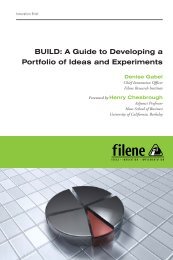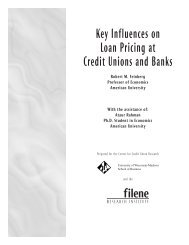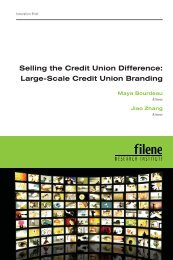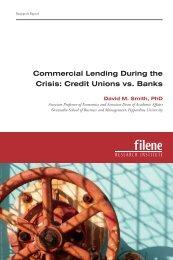Credit Union and Cooperative Patronage Refunds - Filene ...
Credit Union and Cooperative Patronage Refunds - Filene ...
Credit Union and Cooperative Patronage Refunds - Filene ...
Create successful ePaper yourself
Turn your PDF publications into a flip-book with our unique Google optimized e-Paper software.
We encourage you to have your credit union’s articles of incorporation<br />
<strong>and</strong> bylaws reviewed by legal counsel for the specific purpose of<br />
learning whether your credit union might be prohibited from paying<br />
a patronage refund. Our concern arises from the fact that at dissolution,<br />
credit union statutes appear to favor share ownership over<br />
historical patronage.<br />
If the owners of shares in the credit union are the beneficiaries of the<br />
remaining proceeds in dissolution, the question arises whether they<br />
could object to any payment that is not paid on the basis of ownership<br />
while the credit union is operating. We recommend that you<br />
discuss with your legal counsel whether your credit union should<br />
amend its articles <strong>and</strong> bylaws to specifically allow payments of<br />
patronage refunds on a patronage basis any time prior to a dissolution<br />
vote.<br />
Future Tax Considerations<br />
Nothing on the horizon points to any modification of the federal tax<br />
exemptions that apply to federal or state- chartered credit unions. In<br />
this section, we consider two alternatives: (1) that credit unions are<br />
taxed under Subchapter T <strong>and</strong> (2) an argument for why 501(c)(14)<br />
<strong>and</strong> 501(c)(1) tax statutes will not be touched.<br />
The Case for Subchapter T<br />
From time to time, the General Accounting Office (GAO) prepares<br />
reports on tax- exempt business entities. In 2005, the GAO prepared<br />
a report on credit unions that, aside from reciting the arguments for<br />
<strong>and</strong> against the tax exemption, contained no recommendations for or<br />
against the tax exemption.<br />
In 1983, the GAO issued a report recommending that Congress<br />
consider taxing rural electric cooperatives under Subchapter T. The<br />
recommendation was not adopted by Congress, but in this section<br />
we consider what would happen if the GAO made the same recommendation<br />
for taxation of credit unions. Assuming that Congress<br />
acted on the GAO recommendation this time, we apply Subchapter<br />
T to the 27 credit unions in the Callahan study.<br />
Figure 6, a modification of Figure 1, shows these 27 credit unions<br />
under 501(c)(14) <strong>and</strong> then compares this with two scenarios under<br />
Subchapter T. One scenario shows these credit unions allocating<br />
40% of patronage- sourced income (<strong>and</strong> paying a cash patronage<br />
refund of 20% of the total allocated) <strong>and</strong> paying taxes (federal <strong>and</strong><br />
state) on the other 60%. The other scenario shows these credit<br />
unions allocating 100% of patronage- sourced income <strong>and</strong> paying no<br />
income tax.<br />
51








